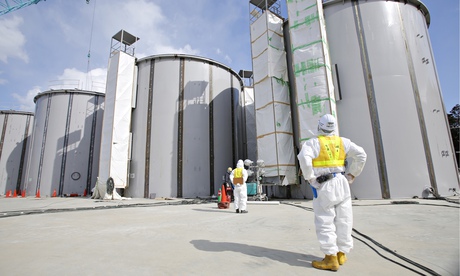 A senior adviser to the operator of the wrecked Fukushima Daiichi nuclear power plant has told the firm that it may have no choice but to eventually dump hundreds of thousands of tonnes of contaminated water into the Pacific Ocean.
A senior adviser to the operator of the wrecked Fukushima Daiichi nuclear power plant has told the firm that it may have no choice but to eventually dump hundreds of thousands of tonnes of contaminated water into the Pacific Ocean.
Speaking to reporters who were on a rare visit to the plant on the eve of the third anniversary of the March 2011 earthquake, tsunami and nuclear disaster, Dale Klein said Tokyo Electric Power [Tepco] had yet to reassure the public over the handling of water leaks that continue to frustrate efforts to clean up the site.
Fukushima operator may have to dump contaminated water into Pacific
Next fracking controversy: In the Midwest, a storm brews over 'frac sand'
 Sand has become a valuable – and deeply divisive – commodity in the upper Midwest. Hydraulic fracturing, a method of extraction also known as fracking that has boosted oil and natural gas production across the United States, requires sand, and there's plenty of it here.
Sand has become a valuable – and deeply divisive – commodity in the upper Midwest. Hydraulic fracturing, a method of extraction also known as fracking that has boosted oil and natural gas production across the United States, requires sand, and there's plenty of it here.
And so in dozens of small towns and rural townships in Minnesota, Illinois, Iowa and especially Wisconsin, the demand for frac sand, as it's called, has brought a surge of new mining activity. Scores of companies have poured in, eager to take advantage of the thick sandstone that underlies the bluffs and ridges of the region's picturesque river country.
Four New Man-Made Gases Found That Harm Ozone Layer
Scientists have detected four new man-made gases that damage the Earth's protective ozone layer, despite bans on almost all production of similar gases under a 1987 treaty, a study showed on Sunday.
The experts were trying to pinpoint industrial sources of tiny traces of the new gases, perhaps used in making pesticides or refrigerants, that were found in Greenland's ice and in air samples in Tasmania, Australia.
Climate change could see 'significant' rise in malaria deaths, study finds
 Future global warming could lead to a significant increase in malaria cases in densely populated regions of Africa and South America unless disease monitoring and control efforts are increased, researchers said Thursday.
Future global warming could lead to a significant increase in malaria cases in densely populated regions of Africa and South America unless disease monitoring and control efforts are increased, researchers said Thursday.
In a study of the mosquito-borne disease that infects around 220 million people a year, researchers from Britain and the United States found what they describe as the first hard evidence that malaria creeps to higher elevations during warmer years and back down to lower altitudes when temperatures cool.
Study Finds Keystone XL Would Have Much Larger Impact Than State Department Suggests
The State Department's final environmental impact analysis for the proposed Keystone XL pipeline downplays the significance the pipeline would have for development of the Canadian tar sands, according to a new analysis from a United Kingdom-based group. The analysis also argues that the State Department underestimated the amount of greenhouse gas emissions that would come with that development.
The Carbon Tracker Initiative, a nonprofit that focuses on how carbon budgets interact with financial markets, released the new report on Monday, making its case for why Keystone XL is more important in the context of global emissions than the State Department's study indicates.
U.S. judge rules for Chevron in Ecuador environmental case
An American lawyer used "corrupt means" to secure a multi-billion-dollar pollution judgment against Chevron Corp in Ecuador, a U.S. judge ruled on Tuesday, handing the oil company a major victory following a six-week trial last year.
In a nearly 500-page decision, U.S. District Judge Lewis Kaplan in New York said he had found "clear and convincing evidence" that attorney Steven Donziger's legal team bribed an Ecuadorean judge to issue an $18 billion judgment in 2011 in favor of a group of villagers. They had claimed Texaco, later acquired by Chevron, contaminated an oil field in northeastern Ecuador between 1964 and 1992.
Former oil exec calls Exxon CEO out on his hypocritical anti-fracking lawsuit
 The news, reported last week by the Wall Street Journal, that Rex Tillerson — the CEO of the world’s largest publicly traded international oil and gas company — was involved in an anti-fracking lawsuit because the drilling was happening where he lives was rightly met with cries of outrage and incredulity.
The news, reported last week by the Wall Street Journal, that Rex Tillerson — the CEO of the world’s largest publicly traded international oil and gas company — was involved in an anti-fracking lawsuit because the drilling was happening where he lives was rightly met with cries of outrage and incredulity.
But as a former Big Oil executive himself, Louis W. Allstadt is in a better place than many to call Tillerson out on his hypocrisy.
More Articles...
Page 48 of 201

 Environmental Glance
Environmental Glance






























